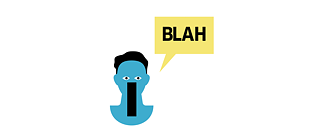Hollow and, above all, pompous verbiage rubs Jagoda Marinić the wrong way. Specifically, she deplores the ubiquitous use of impersonal, objective language drained of all vitality. Why not tell an anecdote instead? she suggests. Get personal, get emotional, take a verbal risk!
I, personally, don’t like it. What about you, impersonally?It took me a long time to figure out why this use of the word persönlich (“personally”) bothered me until I happened upon a piece by Kurt Tucholsky (writing under one of his pseudonyms, Ignaz Wrobel) in a 1925 issue of magazine Die Weltbühne. The title of the article is “Ich persönlich” (“I, personally”) – which fits my present purposes so well that I borrowed it for the title of this week’s Word! column. Tucholsky makes fun of the way we place language between ourselves and others, using it as a shield to hide our own passivity. Unfortunately, the pompousness, which people used to wear round their necks like a medal, remains all too conspicuous in their writing.
The lure of empty verbiage
That’s how it was a hundred years ago. What about today? Nowadays, we can easily get in touch by e-mail – or simply by giving people a call. But no: we set up a video conference instead. This is how the German bureaucratic bent is turning the digital sphere into an obstacle course. Language is misused to suggest busyness and sometimes status. Why is it so hard for Germans to write the way you play ping pong: back and forth, to and fro, quick and quicker? Instead, our noses are glued to the screen and our eyes to empty verbiage. The main thing is that the addressee has got to hack their way through a thicket of hollow introductory and concluding phrases to get at whatever the author might be trying to say.Opt for anecdotes instead
The kind of “ethnography” that I’m doing here and Tucholsky was still doing quite outspokenly in his day is basically no longer tenable today. Were I to write that Americans talk more easily or that Britons, despite the royal family, can handle a brand of candour that defies the rules of etiquette, I’d be asked for proof: “Where’d you get that? Which study? Isn’t all that anecdotal?” But anecdotal knowledge is the kind of knowledge that makes experiences communicable, the world diverse, language lively and the narrator free from the stylistic strictures of objective reporting.If you draw on anecdotes, you can’t pretend to be an expert; you have to show your own powers of observation instead. You can’t report where it says what, where you found your facts. You’re compelled to take the risk of saying how you see things yourself, how you read the world, using language to open yourself up for others to experience.
Recently, when a conference call between German military officials was leaked – it was about possibly supplying Taurus cruise missiles to Ukraine – what intrigued me, beyond the sensational scoop itself, was how a general uses language in such an off-the-record conversation. Reducing language to procedures and projected scenarios strikes me as quite understandable in this case, given the high stakes involved in any decisions taken in an ongoing war. But I’m appalled at the extent to which this way of talking has now spilled over into other domains, including culture and the arts.
Objectivity versus emotion
Listening to people talk often gives the impression that they cling to scripted protocols like a dog guarding a bone. Whenever they go off-script they look startled: Shouldn’t I be getting down to business now? I’d better lower the temperature here: you want to be objective and not get worked up about this. Getting emotional has a dangerous aura about it here in Germany, whereas objectivity is regarded, without question, as a sign of expertise.So I recommend The Zone of Interest, starring Sandra Hüller, a film that vividly demonstrates the dangers of forced objectivity. The protagonists manage to conceal the emotions needed to murder innocent people under a veneer of pseudo-objectivity. It’s hard to understand how a nation like Germany can spend so much time grappling with their Nazi past and yet fail to come to grips with such dark sides of German culture and learn from their past mistakes?.
Don’t risk it!
Nowadays, not many of us dare to stray from the safety of dispassionate discourse. Various speakers put forward theories because you’re all too liable to be judged by others if you risk anything personal. The countless existing varieties of language are increasingly being straitjacketed. What’s left is this unbearable bureaucratization and technocratization of the language. Speech is reduced to mere functionality.Then again, maybe I’m just German grouchiness personified. So why don’t we set up a Teams meeting to discuss this ad nauseam: “Hi, I’m Jagoda, and I’m in charge of ...”
Word! The Language Column
Our column “Word!” appears every two weeks. It is dedicated to language – as a cultural and social phenomenon. How does language develop, what attitude do authors have towards “their” language, how does language shape a society? – Changing columnists – people with a professional or other connection to language – follow their personal topics for six consecutive issues.
March 2024
